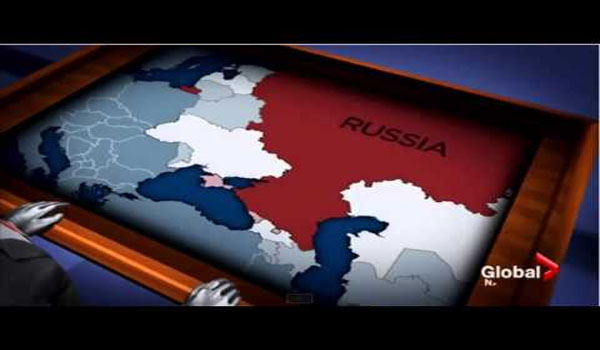Ian Traynor and Ewen MacAskill | The Guardian,
British dilemma over Russian president’s actions in Ukraine likened to conduct of Neville Chamberlain in 1930s Munich
David Cameron has told European leaders that the west risks making similar mistakes in appeasing Vladimir Putin over Ukraine as Britain and France did with Adolf Hitler in the run-up to the second world war.
In a heated debate about the crisis behind closed doors in Brussels on Saturday, the prime minister told an EU summit that Putin had to be stopped from seizing all of Ukraine, according to La Repubblica, the Italian newspaper, which obtained details of the confidential discussion.
Downing Street declined to confirm the prime minister’s remarks, but did not contest the accuracy of the report.
Cameron likened the west’s dilemma with Putin to the infamous conduct of the British prime minister, Neville Chamberlain, with Hitler in Munich in 1938, when Anglo-French appeasement encouraged the Nazi leader to invade Poland the following year, sparking the second world war.
“We run the risk of repeating the mistakes made in Munich in ’38. We cannot know what will happen next,” Cameron was reported as saying. “This time we cannot meet Putin’s demands. He has already taken Crimea and we cannot allow him to take the whole country.”
EU leaders held the summit to decide on who should be running the union for the next five years, but the session was quickly overtaken by discussion of Putin’s invasion of Ukraine.
The European commission president, José Manuel Barroso, told the summit that Putin had told him his forces, if ordered to do so, could conquer Kiev, the Ukrainian capital, in a fortnight.
According to La Repubblica, Barroso said he asked Putin about the presence of Russian troops in eastern Ukraine. Nato says there are at least 1,000 Russian forces on the wrong side of the border. The Ukrainians put the figure at 1,600.
“The problem is not this, but that if I want I’ll take Kiev in two weeks,” Putin said, according to La Repubblica.
The Kremlin did not deny the remarks but complained loudly that the Russian president had been misquoted and threatened to release the tape of the conversation on Friday between Putin and Barroso.
Senior Russian officials confirmed that Putin had made the remarks. Yuri Ushakov, a Kremlin foreign policy adviser, said the Russian president’s remarks were taken out of context. “This is incorrect, and is outside all the normal framework of diplomatic practice, if he did say it. This is simply not appropriate for a serious political figure,” he said of the Barroso leak, according to the Russian Interfax news agency. Putin’s comments “had a completely different meaning”.
Vladimir Chizhov, Russian ambassador to the EU in Brussels, said he was prepared to release the phone conversation tape.
Petro Poroshenko, the Ukrainian president, attended the EU summit on Saturday and painted an apocalyptic picture of the conflict, with EU leaders in private dropping their usual public poise.
Dalia Grybauskaite, the Lithuanian president, declared that Russia was “at war with Europe“. The German chancellor, Angela Merkel, the main mediator with Putin, was said to be furious with the Russian leader, warning that he was “irrational” and “unpredictable”.
Merkel pointed to the dangers for the Baltic states on Russia’s western borders, home to large ethnic Russian minorities. She warned that Estonia and Latvia could be Putin’s next targets, La Repubblica said.
Defence of the two countries – both are Nato, EU and eurozone members – is the centrepiece of this week’s Nato summit in Wales and the alliance is said to view that defence as a red line that Putin dare not cross. Barack Obama is to deliver a speech in Estonia stressing that message.
The main decisions at the summit in Newport are to deploy rapid response Nato spearhead units to the Baltic and Poland if need be, to stockpile arms and equipment in the region, and to strengthen the international Nato presence in the east.
The plans call for brigade-strength units of up to 4,000 forces to be deployed within two to five days, according to a senior military official at Nato.
To try to avoid a legal dispute with Russia, the Nato basing in the east will not be called “permanent” – proscribed under a Nato-Russia pact from 1997 – but back-to-back rotation of alliance forces will mean that there is a “persistent presence”, according to a senior Nato diplomat.
If the Balts and Poles are reassured by the Nato moves, there will be little short-term comfort for Ukraine at the Nato summit, which Poroshenko is also to attend.
“It’s not actually Nato’s job to be the policeman of Europe. Nato is not the first responder on this,” said the diplomat. “Nato’s planning is all about how to defend allies, not partners like Ukraine.”
Grybauskaite demanded at the weekend that the west armed Ukraine. That is highly unlikely. “Nato is not going to launch a defence capacity-building mission in Ukraine,” said the diplomat. The summit is expected to take Nato membership bids by four former Soviet states “off the table” to avoid antagonising Putin.
Mikhail Popov, a Kremlin military official, said the plans were “evidence of the desire of US and Nato leaders to continue their policy of aggravating tensions with Russia” and Moscow’s military posture would be adapted appropriately.


